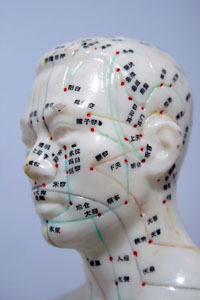Find Balance Through Ancient Healing Techniques
As told by Yan Zhang, Ph.D.

Inserting thin needles on certain points of the body has been used as a form of healing for centuries.
Many Americans are turning to acupressure and acupuncture some of the world’s oldest traditions to help reduce pain, boost the immune system and relieve stress.
Acupuncture has been used as a primary care system by nearly one-third of the world, including countries throughout Asia, Europe and South America. The practice has been used in other countries as non-conventional therapy for 200 years. Acupressure is a Chinese healing art estimated to be more than 5,000 years old and predates acupuncture.
Acupuncture and acupressure may look similar, but are two different non-traditional treatments. Both have been recently evaluated by standards of western medicine, and some studies have found them to be beneficial.
Life Energy
According to the central underlying principle of traditional Chinese medicine, health is achieved by maintaining the body and Qi (pronounced Chee and meaning life energy) in a balanced state. Qi circulates in the body through a system of meridians that connect internal organs with external organs and tissues. Illness or disease occurs when the balance or Qi flow is disrupted.
With acupuncture, hair-thin disposable needles are used to puncture acupoints through the skin, while acupressure uses the fingers to press acupoints on the surface of the skin. By stimulating acupoints where meridians reach through acupressure or acupuncture, the flow of Qi can be regulated, system balance regained and diseases treated with few side effects.
When properly done, acupuncture should not cause much pain, instead the patient may experience a sensation of heaviness, numbness or slight dull ache or a twitch, which mostly indicates that the Qi has arrived at the acupoint called De Qi (Der Chee). The insertion of acupuncture needles must be more precise as compared to the application of acupressure to a larger area. Acupuncture tends to have a relatively delayed but more lasting effect than acupressure.
Acupressure for Osteoarthritis
In western medicine, stimulation of acupoints leads to increased release of endorphins, the body’s natural painkiller. Endorphins reduce pain and induce feelings of happiness. In addition, mechanical pressure such as massage and acupressure has been known to help the body relax.
Finding an acupuncturist to begin treatment is the best starting point. But a person may learn acupressure from a handbook, a practitioner or other resources that may teach them how to press certain acupoints to relieve common discomfort. Acupressure is similar to massage, but massage has a broader scope as it can press any part of the body besides acupoints using fingers, palms, elbows and tools.
Women between the ages of 50 and 70 who have been diagnosed with osteoarthritis of the knee, and are interested in learning more about acupressure may be eligible to participate in an Acupressure for Osteoarthritis study funded by UMC Health System's Women's Health Research Scholar program. Participation is free. For more information or to enroll in the study, call M.J. Flores at (806) 743-4222 ext. 221 or Susan Doctolero at (806) 743-4222 ext. 223.
Related
Healthy Babies are Worth the Wait
Related Stories
Celebrating Veterans: TTUHSC’s General Martin Clay’s Legacy of Service and Leadership
From his initial enlistment in the Army National Guard 36 years ago to his leadership in military and civilian health care management roles, Major General Martin Clay’s career has been shaped by adaptability, mission focus and service to others.
Texas Tech University Health Sciences Center School of Nursing Named Best Accelerated Bachelor of Science in Nursing Program in Texas
The TTUHSC School of Nursing Accelerated Bachelor of Science in Nursing (BSN) program has been ranked the No. 1 accelerated nursing program in Texas by RegisteredNursing.org.
TTUHSC Names New Regional Dean for the School of Nursing
Louise Rice, DNP, RN, has been named regional dean of the TTUHSC School of Nursing on the Amarillo campus.
Recent Stories
National Academy of Inventors Names TTUHSC Faculty Senior Members
The National Academy of Inventors (NAI) has designated two current and one former TTUHSC faculty researchers as Senior Members.
The John Wayne Cancer Foundation Surgical Oncology Fellowship Program at Texas Tech University Health Sciences Center Announced
TTUHSC is collaborating with the John Wayne Cancer Foundation and has established the Big Cure Endowment, which supports the university’s efforts to reduce cancer incidence and increase survivability of people in rural and underserved areas.
TTUHSC Receives $1 Million Gift from Amarillo National Bank to Expand and Enhance Pediatric Care in the Panhandle
TTUHSC School of Medicine leaders accepted a $1 million philanthropic gift from Amarillo National Bank on Tuesday (Feb. 10), marking a transformational investment in pediatric care for the Texas Panhandle.
